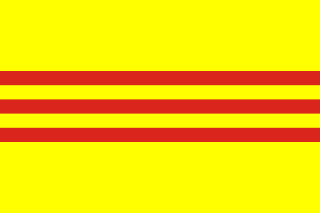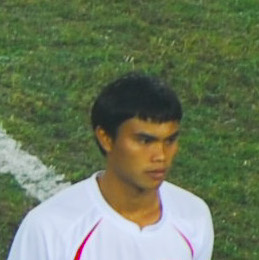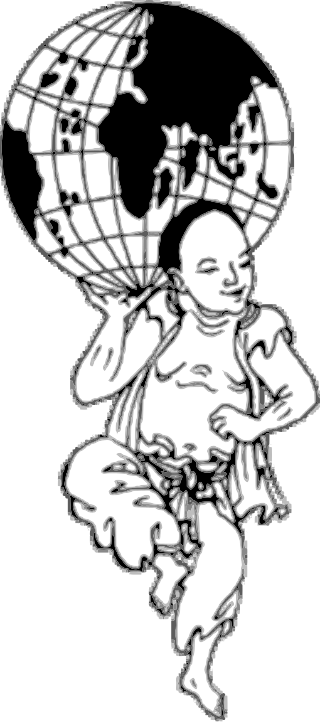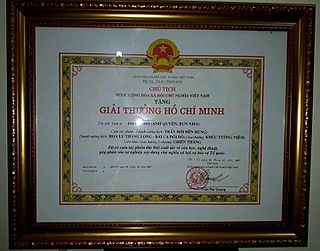Kim Mun is a Mienic language spoken by 200,000 of the Yao people in the Chinese provinces of Guangxi, Hunan and Yunnan, with about 61,000 of the speakers in Hainan Province. There are also speakers in Vietnam, Laos, and Thailand.
Đặng Hữu Phúc is a Vietnamese pianist and composer best known for his film scores. A graduate of the Hanoi Conservatory, he has penned over 60 works, primarily for film and theatre.

The Republic of Vietnam competed as Vietnam at the 1964 Summer Olympics in Tokyo, Japan. 16 competitors, all men, took part in 14 events in 5 sports.

Phan Văn Tài Em is a retired Vietnamese footballer who last played as a midfielder for Dong Tam Long An. He was a member of the Vietnam national football team. He was awarded as the Vietnamese Golden Ball in 2005.

National Route 1, also known as National Route 1A, is the trans-Vietnam highway. The route begins at km 0 at Hữu Nghị Quan Border Gate near the China-Vietnam border, runs the length of the country connecting major cities including Hanoi, Da Nang and Ho Chi Minh City, and ends at km 2301.34 at Năm Căn township in Cà Mau province.
Phan Khôi was an intellectual leader who inspired a North Vietnamese variety of the Chinese Hundred Flowers Campaign, in which scholars were permitted to criticize the government, but for which he himself was ultimately persecuted by the Communist Party of Vietnam.

The Tonkin Free School was a short-lived but historically significant educational institution in Hanoi that aimed to reform Vietnamese society under the French protectorate during the beginning of the 20th century.

Ninh Phước is a district (huyện) of Ninh Thuận province in the Southeast region of Vietnam, south of Phan Rang. It is also known as "Phu Quy". The city is growing at a fairly fast rate compared to other cities in Vietnam. The city has many beaches and resorts that are in the making.
Bruu is a Mon–Khmer dialect continuum spoken by the Bru people of mainland Southeast Asia. Sô and Khua are dialects.

The Republic of Vietnam Military Forces, were the armed forces of the Republic of Vietnam and were responsible for the defence of the country from 8 December 1950 to 30 April 1975. Its predecessor, the Vietnamese National Army, was the armed forces of the State of Vietnam. The Republic of Vietnam Military Forces day has been celebrated in June 19 every years since 1965.

The Hồ Chí Minh Prize is an honorary award given by the government of Vietnam in recognition of cultural and/or scientific achievement. The prize was established by decree in 1981, and has been awarded in 1996, 2000, 2005 and 2012, often posthumously. The prize is named for Ho Chi Minh, who was Chairman and founder of the Workers' Party of Vietnam, that is considered one of the highest honors bestowed by Vietnam.
The Mai Dịch Cemetery is a cemetery in Hanoi, Vietnam, which houses the graves of Communist government leaders and famous revolutionaries.
Nguyễn Hữu Việt was a Vietnamese swimmer who specialized in breaststroke events. He won a total of five medals, and set numerous records for both the 100 and 200 m breaststroke at the Southeast Asian Games (2003–2009).

The Battle of Ngọc Hồi-Đống Đa or Qing invasion of Đại Việt, also known as Victory of Kỷ Dậu, was fought between the forces of the Vietnamese Tây Sơn dynasty and the Qing dynasty in Ngọc Hồi and Đống Đa in northern Vietnam from 1788 to 1789. It resulted in the failure of the Chinese to restore the last Lê emperor Chiêu Thống, who had been usurped by the Tây Sơn. It is considered one of the greatest victories in Vietnamese military history.
Nguyễn Hữu Cầu was the leader of a rebellion of Tonkin peasantry in the 18th century.
The Arbitrator is a 2017 Vietnamese crime drama series, based on the Israel crime drama series The Arbitrator (Ha-Borer).

The 9th Central Committee of the Communist Party of Vietnam was elected at the 9th National Congress of the Communist Party of Vietnam. It elected the 9th Politburo and the 9th Secretariat.
Phí Hữu Tình is a Vietnamese wrestler. He competed in the men's freestyle 62 kg at the 1980 Summer Olympics.
Ngô Hữu Kính is a Vietnamese sports shooter. He competed in the mixed 50 metre free pistol event at the 1980 Summer Olympics.








